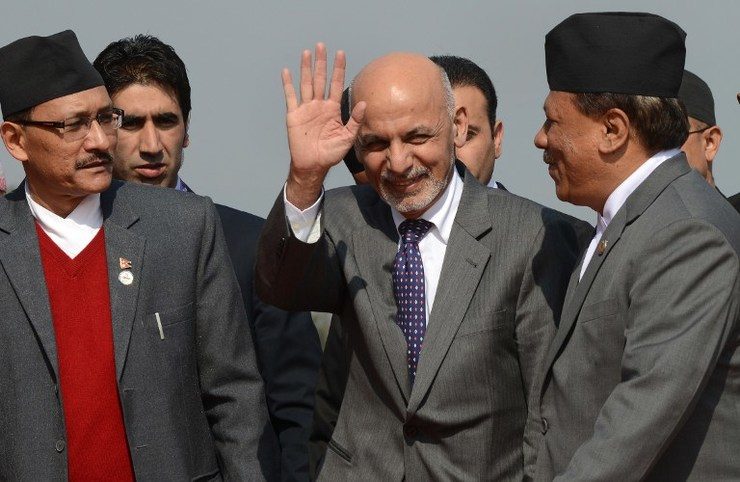SUMMARY
This is AI generated summarization, which may have errors. For context, always refer to the full article.

KATHMANDU, Nepal (UPDATED) – Afghanistan’s new president told the leaders of India and Pakistan he would not let his country become the battleground of a proxy war Wednesday, November 26, as the enmity between South Asia’s arch rivals cast a shadow over a regional summit.
Nuclear-armed neighbors India and Pakistan – bitter and sometimes bloody rivals since gaining independence from Britain in 1947 – have long accused each other of using proxy forces to try to gain influence in Afghanistan.
But the imminent departure of NATO combat forces from Afghanistan has raised fears that rivalry could escalate, further destabilizing the two countries’ troubled neighbor as it seeks to rebuild after decades of war.
President Ashraf Ghani issued his warning to South Asian leaders meeting in the Nepalese capital Kathmandu to try to reinvigorate regional cooperation held back by decades of rivalry between India and Pakistan.
“We will not allow our territory to be used against any of our neighbors. But we will not permit anybody to conduct proxy wars on our soil either,” he told the gathered leaders including Indian Prime Minister Narendra Modi and Pakistan’s Nawaz Sharif.
Ghani’s predecessor Hamid Karzai frequently accused Islamabad of trying to destabilize the Kabul government by giving sanctuary to Taliban fighters.
Only last week, former Pakistan president Pervez Musharraf warned that the departure of NATO troops at the end of the year could provoke a proxy Indo-Pakistan war involving members of Afghanistan’s rival ethnic groups.
Without mentioning Pakistan by name, Ghani said that state sponsorship of non-state actors could have damaging effects.
“It should be clear that such measures have blowback effects, destabilizing the state system,” he said.
‘Dispute free South Asia’
The leaders of the 8 South Asian Association for Regional Cooperation (SAARC) countries are meeting for the first time since the election of a new Indian government eager to improve ties in the face of growing Chinese influence in its backyard.
Regional leaders at the meeting stressed the need for greater cooperation to combat poverty in South Asia, where cross-border trade remains minimal, held back by mistrust and weak infrastructure.
“My vision for our region is a dispute free South Asia where instead of fighting each other we jointly fight poverty, illiteracy, disease, malnourishment and unemployment,” said Pakistan’s Sharif.
But the summit, which comes just weeks after some of the worst cross-border violence in the disputed region of Kashmir in a decade, is already being overshadowed by the rivalry between India and Pakistan.
During his speech, Modi pointedly referred to deadly attacks in Mumbai exactly 6 years ago, which were blamed on Pakistani militants and led to the collapse of peace talks between the two countries.
“In 2008 we felt the endless pain of lost lives. Let us work together to fulfill the pledge we have taken to combat terrorism and transnational crime,” he said.
Ball in India’s court
Modi will hold one-on-one meetings with all the SAARC leaders except Sharif, according to an Indian official who said Islamabad had not requested a meeting.
Sharif said the ball was in India’s court after New Delhi cancelled senior-level talks earlier this year.
Hopes of a move towards reconciliation were raised when Modi invited Sharif to his swearing-in ceremony, but his right-wing nationalist government has adopted a more aggressive policy on Pakistan than its centre-left predecessor.
Modi warned during the recent upsurge in violence in Kashmir that “times have changed and their old habits will not be tolerated”.
“SAARC’s main problem is that SAARC is basically about India and Pakistan, with the Afghanistan dimension thrown in now,” said Sujeev Shakya, chairman of the Nepal Economic Forum.
Modi will hold his first talks with Ghani on the summit’s sidelines later Wednesday as New Delhi seeks to consolidate its influence.
India, the largest regional investor in Afghanistan, is building a huge new parliament in Kabul and funding new roads, dams, infrastructure and reconstruction.
On Tuesday, November 25, Modi oversaw a $1 billion agreement to build a hydropower plant in neighboring Nepal, where China has invested heavily in recent years, saying he wanted to “move forward” with deals long delayed by mutual mistrust.
Modi said India would lead a drive to boost regional trade, committing to lower his country’s large trade deficit with other South Asian nations and make it easier for goods to cross its borders.
He also pledged to launch a communications satellite dedicated to the SAARC nations by 2016.
Trade between the SAARC nations – Afghanistan, Bangladesh, Bhutan, India, Nepal, the Maldives, Pakistan and Sri Lanka – has grown from under $140 million in 2008 to $878 million in 2012, according to SAARC figures.
But it still accounts for less than 5% of the region’s total commerce, according to the Washington-based Brookings Institution. By contrast, trade between East Asian nations accounts for nearly 35% of that region’s total. – Rappler.com
Add a comment
How does this make you feel?
There are no comments yet. Add your comment to start the conversation.